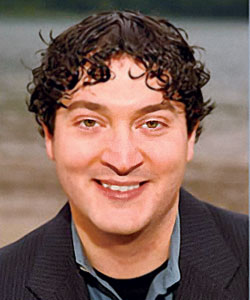
For having just driven nearly 3,000 miles—from Juneau, Alaska, to Chicago—PJ Paparelli looks surprisingly refreshed. Maybe it has something to do with the bounty waiting here for him. The former head of Perseverance Theatre, Alaska's only professional troupe, Paparelli made the cross-continental move to claim his new role as artistic director of American Theater Company. The timing is serendipitous: For months, another local company, Raven Theatre, had been planning the Chicago première of Paparelli's Columbinus, never considering the possibility that the playwright would be around to see the staging. The fortuity brings a note of hope to the play, which looks at adolescent alienation through the lens of the 1999 shootings at Colorado's Columbine High School.
How do you define theatre?
Theatre is a service-driven, not an ego-driven, profession. I believe it can be a vehicle for social change. I'm interested in work that stimulates a conversation, and it's the conversation that completes the theatre experience-the dialogue that continues after the show.
Does Columbinus present a perspective different from Michael Moore's Bowling for Columbine?
It's definitely not like Bowling for Columbine because the goal was not to say, "This is what caused [the massacre]." Columbinus gets you into the everyday lives of these students and explores so many different points of view. It presents all of these perspectives and doesn't give you an answer.
You spoke with survivors and parents of the victims. Were there any moments during your research that were especially enlightening?
Probably making the trip to Columbine High School. I had mythologized it in my mind. But when I saw it, it was a normal high school. And there was something so epic about its normality.
What prompted you to take the job at ATC?
I moved to Juneau [from Shakespeare Theatre Company in Washington, D.C.] to see how art affects an isolated community. At Perseverance there was no traditional theatre demographic. A fisherman could be seated next to a state senator. The community was so small, you really knew your audience and saw them in the grocery store. I wondered if that same community aesthetic could be established in a city like Chicago. Plus, I'm a city boy and was anxious to be stimulated by a big urban environment again. [At ATC] I'm interested in self-generated and original work, as well as classics, that explores in a complex way what it means to be an American.


